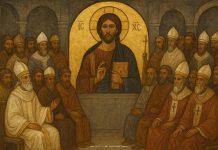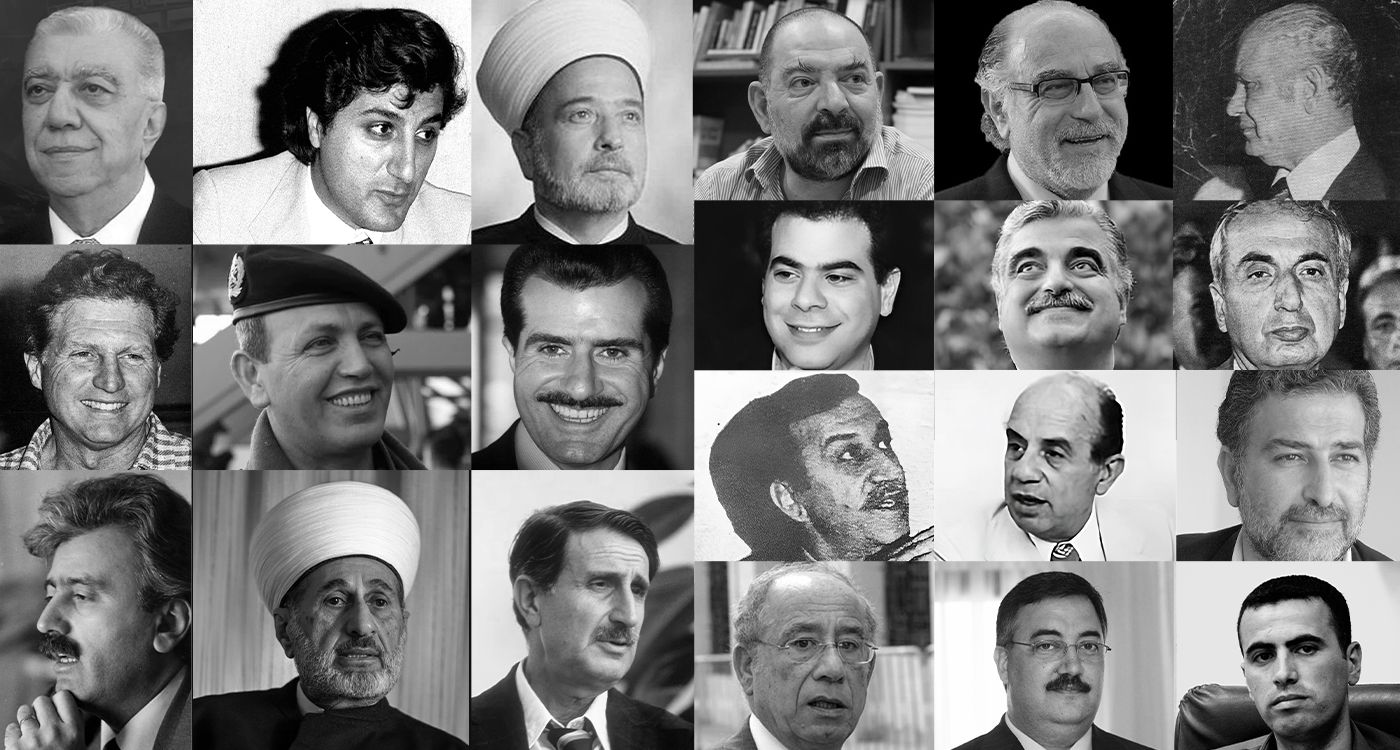اللبنانيون الذين قتلهم نظام الأسد بسبب مواقفهم الوطنية والسيادية
شيرين عبدالله/هذا هو بيروت/9كانون الأول/2024
(ترجمة من الإنكليزية بواسطة موقعي المنسقية وغوغل)
The Lebanese Killed by the Assad Regime for Their Sovereigntist Beliefs
Shirine Abdallah/This is Beirut/December 09/2024
With the fall of Bashar al-Assad, marking the end of 54 years of the brutal dictatorship of the Assad family, driven by a thirst for blood, money and power, let us remember the Lebanese who were murdered for their sovereigntist beliefs and patriotism since 1970 by the Syrian regime. During that year, Hafez al-Assad took power. He never stopped eyeing Lebanon, which he viewed with contempt as an extension of Syria, falsely using his famous slogan, “one people in two countries.”
Kamal Joumblatt
On March 16, 1977, the Druze leader and founder of the Progressive Socialist Party (PSP), Kamal Joumblatt, was shot dead at the age of 60 in his car near the village of Baakline, in the Shouf mountains. The main suspects are members of the Baath Party and the Syrian Social Nationalist Party (SSNP).
Salim Lawzi
A well-known Lebanese journalist and editor, a free-spirited writer, and the founder and editor-in-chief of the weekly magazine Al-Hawadeth, Lawzi, 58, was kidnapped on February 25, 1980. Brutally tortured, his body was found on March 4, 1980. His right hand had been burned with acid. Syrian intelligence services are suspected of having ordered the assassination.
Riad Taha
Taha was an editor and the president of the Lebanese Publishers Association for 13 years. He was shot dead at the age of 53 on July 23, 1980, by a machine gun in front of the Continental Hotel in Beirut after being pursued through the city. His attackers fled the scene. The assassination was not investigated. Riad Taha was a critic of the Syrian occupation.
Bashir Gemayel
The elected president of Lebanon, Bashir Gemayel, 34, commander of the Lebanese Forces, the armed wing of the Kataeb Party, was elected president of Lebanon in 1982. He was assassinated while holding a meeting with his staff by a bomb that destroyed the building housing the party’s headquarters. The attack was planned and carried out by the SSNP. The perpetrator, Habib Chartouni, a member of this pro-Syrian party, was released from prison when the Syrian forces entered Lebanon in 1990.
Sheikh Sobhi el-Saleh
The 60-year-old cleric had received numerous threats due to his sovereigntist positions and his support for a unified Lebanon with all its communities. He was assassinated on the morning of October 7, 1986.
Hassan Khaled
The Mufti of the Republic, 68, was assassinated on May 16, 1989, in a car bomb attack while driving through the western part of Beirut. The bomb was planted in his vehicle. Sheikh Hassan Khaled was a moderate Muslim, advocating for coexistence and harmony among Lebanon’s diverse communities.
Nazem el-Qadri
A Sunni MP for 38 years, Nazem el-Qadri was assassinated on September 22, 1989. At the time of his assassination, Lebanese MPs were preparing for negotiations in Taif, Saudi Arabia, aimed at reaching an agreement to end the war in Lebanon and set a deadline for the withdrawal of Syrian forces. Qadri had just criticized the Syrian presence. His assassination was a message from Syria to other Lebanese MPs, warning them not to push for a Syrian withdrawal.
René Moawad
President René Moawad, 64, who had been in office for just 17 days, was assassinated in a car bomb attack while heading back from the Independence Day celebrations in West Beirut on November 22, 1989. Moawad had sought to establish a national unity government to end the Lebanese Civil War, which was then in its 14th year.
Dany Chamoun
The son of former president Camille Chamoun, 56-year-old Dany Chamoun was assassinated at his home in Baabda on October 21, 1989, by armed men who disguised themselves as Lebanese Army soldiers. His wife and two sons were also killed. Chamoun was a staunch opponent of the government of President Elias Hraoui, who was backed by Syria.
Rafic Hariri
Prime Minister Rafic Hariri, 60, was assassinated on February 14, 2005, when a ton of explosives placed in a parked truck detonated as his convoy passed by. Hariri had become a fierce critic of the Syrian occupation of Lebanon. His assassination triggered the Cedar Revolution, which led to the withdrawal of Syrian troops after 29 years of occupation.
Samir Kassir
A columnist for the daily Al-Nahar and an influential writer, Samir Kassir, 45, was a staunch critic of Syria. He was assassinated on June 2, 2005, in a bomb explosion placed under his seat in his car.
Georges Haoui
Former leader of the Lebanese Communist Party and once a supporter of Palestinian causes, Georges Haoui, 67, was killed on June 21, 2005, by a one-kilogram bomb that exploded under the passenger seat of his car. Haoui had become a fierce critic of Syria and its intelligence services.
Gebran Tueni
A member of Parliament and the publisher of the Lebanese daily newspaper Al-Nahar, Gebran Tueni, 48, was a staunch critic of Syria. He gained international attention in March 2000 when he published an open letter on the front page of his newspaper, addressed to Bashar al-Assad, calling for the withdrawal of Syrian troops from Lebanon. Tueni was killed on December 12, 2005, in a car bomb attack in Mkalles.
Pierre Gemayel
Minister of Industry and opponent of Syrian influence in Lebanon, Pierre Gemayel, 34, was shot dead in his car on October 21, 2006. Gemayel was the son of former President Amine Gemayel (whose brother, Bashir, was assassinated in 1982 just days before becoming president) and the grandson of Pierre Gemayel, founder of the Kataeb Party.
Walid Eido
A member of Parliament and of the Future Movement led by Saad Hariri, Walid Eido, 65, was assassinated in a car bomb attack in Raouche on June 13, 2007. Three days earlier, the United Nations Security Council had passed a resolution calling for the creation of an international tribunal to prosecute those responsible for the assassination of Rafic Hariri. Eido was a vocal critic of Syria.
Antoine Ghanem
A Christian MP and member of the anti-Syrian March 14 coalition, 64-year-old Antoine Ghanem was assassinated in a car bomb attack on September 19, 2007. A member of the Kataeb party, Ghanem had fled Lebanon due to fears for his life and had returned for just two days when he was killed.
François el-Hage
François el-Hage, 54, director of operations at the army command and one of the key commanders in the Battle of Nahr el-Bared against the Fateh el-Islam Islamist group, was killed in a car bomb attack on December 12, 2007, in Baabda. His name had been circulating as a candidate for the position of army commander-in-chief.
Wissam Eid
At 32 years old, this officer of the Internal Security Forces was responsible for the technical aspects of investigations into attacks since 2004, including that of former Prime Minister Rafic Hariri. His work greatly contributed to the progress of the investigation by the Special Tribunal for Lebanon, which was handling the Hariri case. On January 25, 2008, at 10 AM, he was killed in a car bomb attack in Furn el-Chebbak.
Wissam el-Hassan
The head of the Internal Security Forces Intelligence Branch and an opponent of the Damascus regime, 47-year-old Wissam el-Hassan was killed in a car bomb attack on October 19, 2012, due to his role in the investigation into the assassination of Rafic Hariri, attributed to Hezbollah.
Mohammad Chatah
Appointed Minister of Finance in July 2008 and foreign policy adviser to Prime Minister Saad Hariri from November 2009 to January 2011, 62-year-old Mohammad Chatah was killed in a bombing on December 27 in downtown Beirut. Just moments before his death, Chatah had accused Hezbollah of “pressuring for powers similar to those Syria held in Lebanon for 15 years over security and foreign policy.”
اللبنانيون الذين قتلهم نظام الأسد بسبب مواقفهم الوطنية والسيادية
شيرين عبدالله/هذا هو بيروت/9كانون الأول/2024
(ترجمة من الإنكليزية بواسطة موقعي المنسقية وغوغل)
مع سقوط بشار الأسد، معلنًا نهاية 54 عامًا من الديكتاتورية الوحشية لعائلة الأسد، التي كانت مدفوعة بعطشها للدماء والمال والسلطة، دعونا نتذكر اللبنانيين الذين قتلوا بسبب إيمانهم بالسيادة ووطنهم منذ عام 1970 على يد النظام السوري. في ذلك العام، تولى حافظ الأسد السلطة ولم يتوقف عن التطلع إلى لبنان، الذي نظر إليه بازدراء كامتداد لسوريا، مستخدمًا شعاره الشهير بشكل زائف: “شعب واحد في بلدين”.
كمال جنبلاط
في 16 مارس 1977، قُتل الزعيم الدرزي ومؤسس الحزب التقدمي الاشتراكي، كمال جنبلاط، رمياً بالرصاص عن عمر يناهز 60 عامًا في سيارته بالقرب من قرية بعقلين في جبال الشوف. المشتبه بهم الرئيسيون هم أعضاء في حزب البعث والحزب السوري القومي الاجتماعي.
سليم اللوزي
صحافي لبناني معروف ومؤسس ورئيس تحرير مجلة “الحوادث” الأسبوعية، اختطف اللوزي، 58 عامًا، في 25 فبراير 1980. تعرض لتعذيب وحشي وعُثر على جثته في 4 مارس 1980. أُحرقت يده اليمنى بالحمض. يُشتبه في أن أجهزة المخابرات السورية أصدرت أوامر باغتياله.
رياض طه
رئيس نقابة الصحافة اللبنانية لمدة 13 عامًا، قُتل رياض طه، 53 عامًا، برصاص رشاش أمام فندق كونتيننتال في بيروت في 23 يوليو 1980، بعدما تم مطاردته في المدينة. لم يتم التحقيق في اغتياله، وكان طه من منتقدي الاحتلال السوري.
بشير الجميل
الرئيس المنتخب للبنان وقائد القوات اللبنانية، الجناح المسلح لحزب الكتائب، انتُخب بشير الجميل، 34 عامًا، رئيسًا للبنان عام 1982. اغتيل أثناء اجتماع مع فريقه بانفجار قنبلة دمرت المبنى الذي يضم مقر الحزب. تم تنفيذ الهجوم من قبل الحزب السوري القومي الاجتماعي، وأُطلق سراح منفذ الهجوم حبيب الشرتوني، عند دخول القوات السورية إلى لبنان عام 1990.
الشيخ صبحي الصالح
تلقى رجل الدين البالغ من العمر 60 عامًا العديد من التهديدات بسبب مواقفه السيادية ودعمه للبنان الموحد بجميع طوائفه. اغتيل صباح 7 أكتوبر 1986.
حسن خالد
مفتي الجمهورية، البالغ من العمر 68 عامًا، اغتيل في 16 مايو 1989 في هجوم بسيارة مفخخة أثناء مروره في غرب بيروت. كان الشيخ حسن خالد مسلماً معتدلاً دعا إلى التعايش والتناغم بين الطوائف المختلفة في لبنان.
نازم القادري
النائب السني لمدة 38 عامًا، اغتيل في 22 سبتمبر 1989. في ذلك الوقت، كان النواب اللبنانيون يستعدون لمفاوضات الطائف في السعودية للتوصل إلى اتفاق لإنهاء الحرب اللبنانية وتحديد جدول زمني لانسحاب القوات السورية. كان اغتياله رسالة من سوريا لتحذير النواب من المطالبة بالانسحاب السوري.
رينيه معوض
الرئيس رينيه معوض، 64 عامًا، الذي شغل منصبه لمدة 17 يومًا فقط، اغتيل في هجوم بسيارة مفخخة أثناء عودته من احتفالات عيد الاستقلال في غرب بيروت في 22 نوفمبر 1989. كان معوض يسعى لتشكيل حكومة وحدة وطنية لإنهاء الحرب الأهلية اللبنانية التي كانت قد استمرت 14 عامًا.
داني شمعون
نجل الرئيس السابق كميل شمعون، اغتيل داني شمعون، البالغ من العمر 56 عامًا، في منزله في بعبدا في 21 أكتوبر 1989 على يد مسلحين متنكرين بزي جنود الجيش اللبناني. قُتلت معه زوجته وولديه. كان شمعون من المعارضين الشرسين لحكومة الرئيس إلياس الهراوي المدعومة من سوريا.
رفيق الحريري
رئيس الوزراء رفيق الحريري، 60 عامًا، اغتيل في 14 فبراير 2005 عندما انفجرت شاحنة محملة بطن من المتفجرات أثناء مرور موكبه. أصبح الحريري من أشد منتقدي الاحتلال السوري للبنان. أدى اغتياله إلى اندلاع ثورة الأرز التي أجبرت القوات السورية على الانسحاب بعد 29 عامًا من الاحتلال.
سمير قصير
كاتب عمود في صحيفة النهار وكاتب مؤثر، اغتيل سمير قصير، البالغ من العمر 45 عامًا، في 2 يونيو 2005 إثر انفجار قنبلة زرعت تحت مقعد سيارته. كان قصير ناقدًا شديدًا للنظام السوري.
جورج حاوي
القائد السابق للحزب الشيوعي اللبناني وداعم سابق للقضايا الفلسطينية، اغتيل جورج حاوي، 67 عامًا، في 21 يونيو 2005 بواسطة قنبلة تزن كيلوغرامًا واحدًا انفجرت تحت مقعده في السيارة. أصبح حاوي ناقدًا شديدًا لسوريا وأجهزتها الأمنية.
جبران تويني
نائب في البرلمان وناشر صحيفة النهار اللبنانية، اغتيل جبران تويني، 48 عامًا، في 12 ديسمبر 2005 في هجوم بسيارة مفخخة في منطقة المكلس. كان تويني من أشد منتقدي سوريا، واكتسب شهرة دولية عندما نشر رسالة مفتوحة إلى بشار الأسد في مارس 2000 يطالبه فيها بسحب القوات السورية من لبنان.
بيار الجميل
وزير الصناعة ومعارض للنفوذ السوري في لبنان، اغتيل بيار الجميل، 34 عامًا، بالرصاص أثناء وجوده في سيارته في 21 أكتوبر 2006. كان بيار نجل الرئيس السابق أمين الجميل، الذي اغتيل شقيقه بشير الجميل عام 1982 قبل أيام قليلة من توليه الرئاسة.
وليد عيدو
نائب في البرلمان وعضو في تيار المستقبل بقيادة سعد الحريري، اغتيل وليد عيدو، 65 عامًا، في هجوم بسيارة مفخخة في الروشة في 13 يونيو 2007. قبل ثلاثة أيام فقط، أصدر مجلس الأمن الدولي قرارًا بإنشاء محكمة دولية لمحاكمة المسؤولين عن اغتيال رفيق الحريري. كان عيدو من المنتقدين العلنيين لسوريا.
أنطوان غانم
نائب مسيحي وعضو في تحالف 14 آذار المناهض لسوريا، اغتيل أنطوان غانم، البالغ من العمر 64 عامًا، في هجوم بسيارة مفخخة في 19 سبتمبر 2007. كان غانم قد عاد إلى لبنان قبل يومين فقط بعد أن غادر بسبب مخاوف على حياته.
فرانسوا الحاج
مدير العمليات في قيادة الجيش وأحد القادة البارزين في معركة نهر البارد ضد جماعة فتح الإسلام الإرهابية، اغتيل فرانسوا الحاج، البالغ من العمر 54 عامًا، في هجوم بسيارة مفخخة في 12 ديسمبر 2007 في بعبدا. كان اسمه متداولًا كمرشح لمنصب قائد الجيش.
وسام عيد
ضابط في قوى الأمن الداخلي، كان مسؤولًا عن التحقيقات التقنية في الهجمات منذ عام 2004، بما في ذلك اغتيال رفيق الحريري. ساهم عمله بشكل كبير في تقدم التحقيقات في المحكمة الدولية الخاصة بلبنان. اغتيل وسام عيد، البالغ من العمر 32 عامًا، في هجوم بسيارة مفخخة في 25 يناير 2008 في فرن الشباك.
وسام الحسن
رئيس فرع المعلومات في قوى الأمن الداخلي ومعارض للنظام السوري، اغتيل وسام الحسن، البالغ من العمر 47 عامًا، في 19 أكتوبر 2012، بسبب دوره في التحقيق في اغتيال رفيق الحريري المنسوب إلى حزب الله.
محمد شطح
وزير المالية السابق ومستشار رئيس الوزراء سعد الحريري للشؤون الخارجية، اغتيل محمد شطح، البالغ من العمر 62 عامًا، في تفجير بوسط بيروت في 27 ديسمبر 2013. قبل لحظات من اغتياله، كان قد اتهم حزب الله بمحاولة فرض نفوذ يشبه النفوذ السوري في لبنان.






















